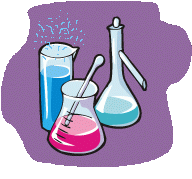


Description of experiment
Below follows a plain text transcript of the selected experiment.
![]()
Needed compounds:
-----------------
hydrogen peroxide : H2O2
sodium persulfate : Na2S2O8
sodium hydroxide : NaOH
hydrochloric acid : HCl
vanadyl sulfate : VOSO4.5H2O
zinc : Zn
Class:
------
elem=V,Zn
coordination
redox
Summary:
--------
Vanadium(III) hydroxide apparently forms a precipitate and does not
dissolve in strongly alkaline liquids.
Vanadium (III) and (IV) are oxidized by peroxodisulfate to vanadium (V).
Description:
------------
Add some zinc to a solution of vanadyl sulfate in dilute hydrochloric acid:
The liquid turns green and lateron it turns greyish green (part of the
vanadium is reduced to vanadium (II)).
Wait for a few hours, while keeping liquid in contact with air: The liquid
has turned fairly dark green. Apparently the V2+ ions are oxidized by air
to V3+, resulting in a moss-like dark green color.
Add an excess amount of a solution of NaOH: Formation of a pale dirty-green
precipitate (mix of vanadium (III) hydroxide and zinc hydroxide????).
Add an excess amount of HCl (10% by weight): Liquid becomes clear again and
has a green color again. The color, however, has a blue hue right now.
Probably part of the vanadium (III) hydroxide is oxidized to a vanadium (IV)
species by oxygen from the air.
Add an excess amount of Na2S2O8: The color of the liquid becomes lighter. It
appears to become cyan, but after a while it becomes green/blue. The liquid
remains green/blue, even after standing for an hour. No smell of chlorine
is observed, hence no oxidation of HCl by the peroxodisulfate. Is the green
color due to a mix of [VO]2+ and [VO2]+ ???
Add some H2O2 (3% by weight): The liquid turns deep red/brown.
![]()